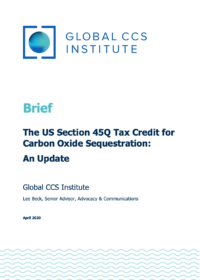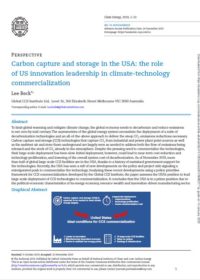Resources
Publications
Our publications, reports and research library hosts over 500 specialist reports and research papers on all topics associated with CCS.
View our Publication Library Disclaimer.
Filter by
Scaling up the CCS Market to Deliver Net-Zero Emissions
20th April 2020
Organisation(s): Global CCS Institute
Topic(s): Carbon capture and storage (CCS), CCS facilities, Policy law and regulation
Understanding how the CCS market is likely to develop over the coming years is of interest to a wide range of stakeholders. It can help inform the timing and design of policies introduced by governments, the scale of the market for potential investors, and the challenges associated with meeting long-term climate targets.
This report aims to inform the discussion on these topics by providing an overview of the near-term and longer-term developments in the CCS market.
It reviews the current CCS facility pipeline, and how that could change in the next few years given project lead-in times. It then considers how this compares to projections of the number of CCS facilities needed to meet long-term climate goals. Throughout the report the number of CCS facilities deployed is used as a proxy for the size of the CCS market.
Disclaimer
The content within the Global CCS Institute Publications, Reports and Research Library is provided for information purposes only. We make every effort and take reasonable care to keep the content of this section up-to-date and error-free. However, we make no claim as to its accuracy, currency or reliability.
Content and material featured within this section of our website includes reports and research published by third parties. The content and material may include opinions and recommendations of third parties that do not reflect those held by the Global CCS Institute.
The US Section 45Q Tax Credit for Carbon Oxide Sequestration: An Update
16th April 2020
Organisation(s): Global CCS Institute
Topic(s): Carbon capture use and storage (CCUS), Policy law and regulation
In February 2020, the US Internal Revenue Service published Notice 2020-12 and Revenue Procedure 2020-12, which include updated guidance regarding the Section 45Q Credit. Among other areas, this notice focuses on the eligibility requirements for the date of construction commencement and partnership structures.
Our Washington, DC-based Senior Advisor for Advocacy and Communications, Lee Beck, has prepared an Issue Brief on the latest developments.
Disclaimer
The content within the Global CCS Institute Publications, Reports and Research Library is provided for information purposes only. We make every effort and take reasonable care to keep the content of this section up-to-date and error-free. However, we make no claim as to its accuracy, currency or reliability.
Content and material featured within this section of our website includes reports and research published by third parties. The content and material may include opinions and recommendations of third parties that do not reflect those held by the Global CCS Institute.
Global Status of CCS: Brief for Policymakers
4th March 2020
Organisation(s): Global CCS Institute
Topic(s): Carbon capture and storage (CCS), Policy law and regulation
The Global CCS Institute is pleased to present a Brief for Policymakers: CCS - Targeting Climate Change.
The brief summarizes the key findings of the Institute's latest Global Status of CCS Report which documents a range of important milestones for CCS, its status across the world and the key opportunities and benefits the technology presents.
The Brief includes detailed information on:
- CCS and its role in climate mitigation
- CCS deployment around the world
- the role of policy in large-scale deployment and
- updates on the progress, projects, and policies globally.
We hope you enjoy it, share it with colleagues and look forward to working with you as we accelerate the deployment of carbon capture and storage globally.
Disclaimer
The content within the Global CCS Institute Publications, Reports and Research Library is provided for information purposes only. We make every effort and take reasonable care to keep the content of this section up-to-date and error-free. However, we make no claim as to its accuracy, currency or reliability.
Content and material featured within this section of our website includes reports and research published by third parties. The content and material may include opinions and recommendations of third parties that do not reflect those held by the Global CCS Institute.
The European Green Deal: New opportunities to scale up carbon capture and storage
27th February 2020
Organisation(s): Global CCS Institute
Topic(s): Carbon capture and storage (CCS), Carbon removal, Policy law and regulation
The recent reports of the Intergovernmental Panel on Climate Change (IPCC), and the Commission vision for a climate neutral Europe , have mobilised support for climate neutrality by 2050 by most EU Member States. Balancing sources and sinks by 2050, and from that point onwards achieving net negative emissions, can only be delivered through a major economy-wide transformation and by substantially stepping up the use of all climate change mitigation and carbon removal technologies. The European Green Deal as the new big European project is an enormous challenge but also an opportunity to lead by example and transform the European economy.
This overview takes a closer look at the European Green Deal with its extensive list of initiatives, and highlights what to watch out for in the coming days, months and years regarding low carbon technologies like carbon capture and storage (CCS). This paper explores how climate targets, governance, just transition, carbon border adjustment, industrial strategy, hydrogen, financing and infrastructure can support CCS technologies. The second part of the paper highlights the three main challenges for CCS in the existing legislation that need to be considered in the upcoming wave of revisions and new initiatives.
It’s a snapshot of where we are as of February 2020, with a list of initiatives and processes to choose from when engaging with policymakers and stakeholders.
This piece was authored by Eve Tamme, Senior Advisor for Climate Change Policy at the Global CCS Institute.
Disclaimer
The content within the Global CCS Institute Publications, Reports and Research Library is provided for information purposes only. We make every effort and take reasonable care to keep the content of this section up-to-date and error-free. However, we make no claim as to its accuracy, currency or reliability.
Content and material featured within this section of our website includes reports and research published by third parties. The content and material may include opinions and recommendations of third parties that do not reflect those held by the Global CCS Institute.
Carbon capture and storage in the USA: the role of US innovation leadership in climate-technology commercialization
16th January 2020
Organisation(s): Global CCS Institute
Topic(s): Carbon capture and storage (CCS), CCS protocol, Innovation, United States
To limit global warming and mitigate climate change, the global economy needs to decarbonize and reduce emissions to net-zero by mid-century. The asymmetries of the global energy system necessitate the deployment of a suite of decarbonization technologies and an all-of-the-above approach to deliver the steep CO2-emissions reductions necessary. Carbon capture and storage (CCS) technologies that capture CO2 from industrial and power-plant point sources as well as the ambient air and store them underground are largely seen as needed to address both the flow of emissions being released and the stock of CO2 already in the atmosphere. Despite the pressing need to commercialize the technologies, their large-scale deployment has been slow.
Initial deployment, however, could lead to near-term cost reduction and technology proliferation, and lowering of the overall system cost of decarbonization. As of November 2019, more than half of global large-scale CCS facilities are in the USA, thanks to a history of sustained government support for the technologies. Recently, the USA has seen a raft of new developments on the policy and project side signaling a reinvigorated push to commercialize the technology. Analysing these recent developents using a policy-priorities framework for CCS commercialization developed by the Global CCS Institute, this paper by Lee Beck, our US-based Senior Advisor for Advocacy and Communications, assesses the USA’s position to lead large-scale deployment of CCS technologies to commercialization. It concludes that the USA is in a prime position due to the political economic characteristics of its energy economy, resource wealth and innovation-driven manufacturing sector.
Disclaimer
The content within the Global CCS Institute Publications, Reports and Research Library is provided for information purposes only. We make every effort and take reasonable care to keep the content of this section up-to-date and error-free. However, we make no claim as to its accuracy, currency or reliability.
Content and material featured within this section of our website includes reports and research published by third parties. The content and material may include opinions and recommendations of third parties that do not reflect those held by the Global CCS Institute.
Waste-to-Energy with CCS: A pathway to carbon-negative power generation
14th October 2019
Organisation(s): Global CCS Institute
Topic(s): Carbon capture and storage (CCS), Waste to energy
A growing global population and rising living standards are producing ever greater quantities of municipal solid waste (MSW). This same growth in population and living standards is also driving ever-larger demand for energy, especially electricity.
A key solution to increasing quantities of waste, rising energy demand and methane emissions from MSW is Waste-to-Energy (WtE); the generation of energy – in the form of electricity and heat – from the processing of waste. The addition of carbon capture and storage (CCS) to WtE has the potential to make waste a zero or even negative emissions energy source, depending upon the origin of the wastes utilised.
In our latest Perspective, Senior Consultant - Capture Technology, David T. Kearns, provides an overview of Waste-to-Energy including how it works and its relation to climate change. The Perspective also discusses how the addition of CCS has the potential to make waste a zero, or even negative, emissions energy source.
Lessons and Perceptions: Adopting a Commercial Approach to CCS Liability
14th August 2019
Organisation(s): Global CCS Institute
Topic(s): CCS liability, CCS projects, Liability
Liability has long been raised as a significant barrier to the wide scale deployment of carbon capture and storage (CCS). Despite regulatory developments, the topic of liability continues to be considered by some CCS project developers, policy-makers and regulators as a critical issue and potential ‘show-stopper’ for the technology’s deployment.
This report, through policy and regulatory analysis as well as interviews with policy makers, regulators, lawyers, project proponents and representative from the insurance sector, seeks to challenge these views and make the case for a more commercially-minded view of liability.
The report’s findings reveal that many of the liabilities borne under CCS-specific models are both familiar and eminently manageable. Furthermore, the report demonstrates proposed solutions and examples available in addressing liability for those seeking to invest in or operate CCS projects.
The report also examines the meaning of liability throughout the CCS lifecycle and the unique challenges presented by greenhouse emissions/climate liabilities. The critical role of government and the private sector in allocating and managing risks across the CCS project lifecycle, as well as the essential requirement for further engagement of the insurance sector to assist operators manage liabilities are also topics addressed through this timely report.
The report will be of particular interest to government policy makers, regulatory bodies, CCS project proponents, investors and those in the insurance sector wishing to further understand the topic of liability, the reasons why it is perceived as a barrier to CCS deployment and gain insights into how these barriers have been - and may continue to be - managed and overcome.
The LCFS and CCS Protocol: An Overview for Policymakers and Project Developers
24th May 2019
Organisation(s): Global CCS Institute
Topic(s): Biofuels / Bioenergy, CCS protocol, Policy law and regulation, United States
The Global CCS Institute has launched a report analyzing California’s recently passed carbon capture and storage protocol. The report provides a summary of the regulation for project developers and policymakers in other states and countries, given the Protocol's global applicability. While comparing it to other relevant regulations – including the federal carbon capture tax credit also known as 45Q – the report seeks to raise awareness for the opportunities created through the protocol and to advance deployment opportunities.
The protocol incentivizes carbon capture and storage projects reducing the lifecycle emissions from bioethanol, hydrogen, and crude, provided the fuel is sold into the California market, as well as direct air capture projects globally.
Bioenergy and Carbon Capture and Storage
14th March 2019
Organisation(s): Global CCS Institute
Topic(s): Bioenergy with carbon capture and storage (BECCS), Biofuels / Bioenergy, Negative emissions technologies
After almost thirty years of climate change negotiations, global CO2 levels are still rising (NOAA, 2018). The UNFCCC Paris Agreement goals of holding global warming to ‘well-below’ 2°C and to ‘pursue efforts’ to limit it to 1.5°C are in stark contrast to the ever-dwindling carbon budget.
The evidence makes it clear. CO2 needs to be removed from the atmosphere, known as carbon dioxide removal (CDR), using negative emissions technologies (NETs) to meet global warming targets. Bioenergy with carbon capture and storage (BECCS) is emerging as the best solution to decarbonise emission-intensive industries and sectors and enable negative emissions.
This Perspective from Christopher Consoli, Senior Consultant - Storage, explores this technology and its deployment as a climate mitigation solution.
Financing BECCS in developing countries
11th February 2019
Organisation(s): Global CCS Institute
Topic(s): Bioenergy with carbon capture and storage (BECCS), Bioethanol, Project financing
Bioenergy with carbon capture and storage (BECCS) is a promising class of technologies for carbon dioxide (CO2) removal and consists of the capture and permanent geological storage of CO2 stemming from biomass transformation or combustion. Several industrial sectors can implement this technology, including the biofuel sector which is predominantly made up of bioethanol production. Bioethanol is one of the few renewable alternatives to oil and gas-based liquid fuel, with which it can be easily blended to be used as a transportation fuel.
As countries seek to decarbonise transport, demand for bioethanol is set to grow globally. By integrating CCS into the production process for bioethanol, negative emissions can be created. It is forecast that a significant proportion of the world’s bioethanol production will come from developing countries (International Energy Agency, 2018).
This brief focuses on how the production of bioethanol with CCS can be supported by climate finance providers, and the pivotal role Brazil can play in facilitating this process.
Global Status of CCS Report: 2018
10th December 2018
Organisation(s): Global CCS Institute
Topic(s): Carbon capture and storage (CCS), CCS policy, CO2 hubs, CO2 storage, CO2 transport
The Global Status of CCS Report 2018 documents the status of CCS around the world and significant operational milestones over the past 12 months. It demystifies common misunderstandings about the technology and identifies where and how it can, and must, be more widely deployed. It also tracks the worldwide progress of CCS technologies and the key opportunities and challenges CCS faces.
Disclaimer
The content within the Global CCS Institute Publications, Reports and Research Library is provided for information purposes only. We make every effort and take reasonable care to keep the content of this section up-to-date and error-free. However, we make no claim as to its accuracy, currency or reliability.
Content and material featured within this section of our website includes reports and research published by third parties. The content and material may include opinions and recommendations of third parties that do not reflect those held by the Global CCS Institute.
CCS Policy Indicator (CCS-PI)
16th October 2018
Organisation(s): Global CCS Institute
Topic(s): Carbon capture use and storage (CCUS), Economics, Policy law and regulation, Project financing
Government policy, given effect through law and the allocation of public resources, is critical to achieving climate targets. It plays a material role in determining the return on investment for any climate mitigation technology making confidence in government policy a pre-requisite of investment.
The CCS-PI tracks the development of government policy to accelerate the deployment of CCS as an essential climate mitigation technology in over 100 countries.
Disclaimer
The content within the Global CCS Institute Publications, Reports and Research Library is provided for information purposes only. We make every effort and take reasonable care to keep the content of this section up-to-date and error-free. However, we make no claim as to its accuracy, currency or reliability.
Content and material featured within this section of our website includes reports and research published by third parties. The content and material may include opinions and recommendations of third parties that do not reflect those held by the Global CCS Institute.











